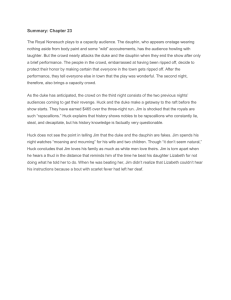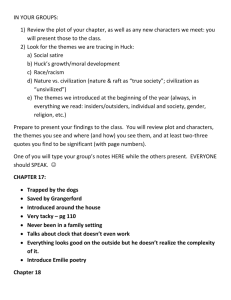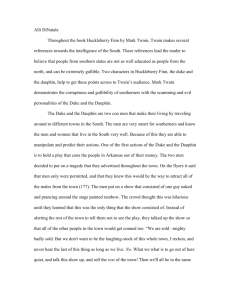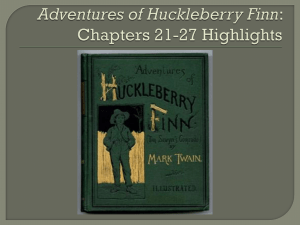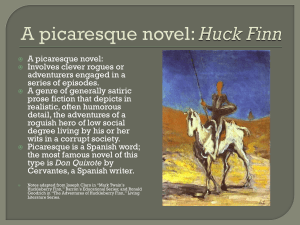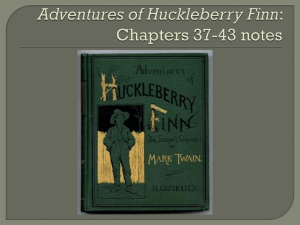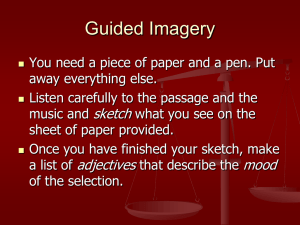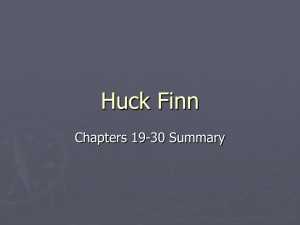Huck_Finn_3 - pfchang1
advertisement
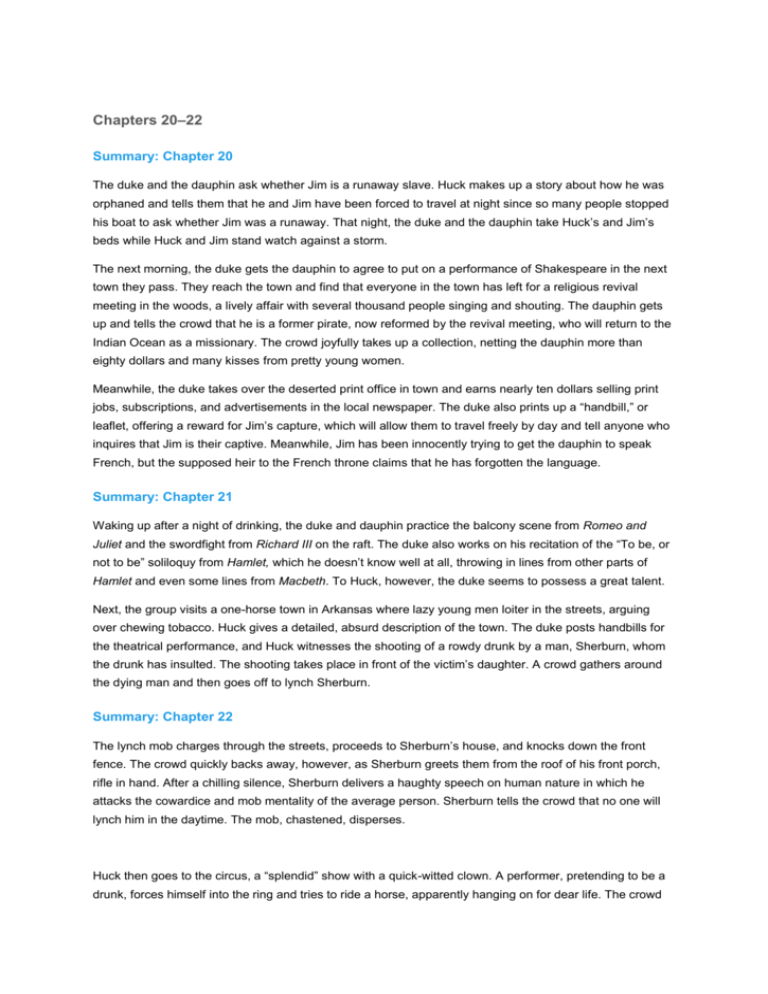
Chapters 20–22 Summary: Chapter 20 The duke and the dauphin ask whether Jim is a runaway slave. Huck makes up a story about how he was orphaned and tells them that he and Jim have been forced to travel at night since so many people stopped his boat to ask whether Jim was a runaway. That night, the duke and the dauphin take Huck’s and Jim’s beds while Huck and Jim stand watch against a storm. The next morning, the duke gets the dauphin to agree to put on a performance of Shakespeare in the next town they pass. They reach the town and find that everyone in the town has left for a religious revival meeting in the woods, a lively affair with several thousand people singing and shouting. The dauphin gets up and tells the crowd that he is a former pirate, now reformed by the revival meeting, who will return to the Indian Ocean as a missionary. The crowd joyfully takes up a collection, netting the dauphin more than eighty dollars and many kisses from pretty young women. Meanwhile, the duke takes over the deserted print office in town and earns nearly ten dollars selling print jobs, subscriptions, and advertisements in the local newspaper. The duke also prints up a “handbill,” or leaflet, offering a reward for Jim’s capture, which will allow them to travel freely by day and tell anyone who inquires that Jim is their captive. Meanwhile, Jim has been innocently trying to get the dauphin to speak French, but the supposed heir to the French throne claims that he has forgotten the language. Summary: Chapter 21 Waking up after a night of drinking, the duke and dauphin practice the balcony scene from Romeo and Juliet and the swordfight from Richard III on the raft. The duke also works on his recitation of the “To be, or not to be” soliloquy from Hamlet, which he doesn’t know well at all, throwing in lines from other parts of Hamlet and even some lines from Macbeth. To Huck, however, the duke seems to possess a great talent. Next, the group visits a one-horse town in Arkansas where lazy young men loiter in the streets, arguing over chewing tobacco. Huck gives a detailed, absurd description of the town. The duke posts handbills for the theatrical performance, and Huck witnesses the shooting of a rowdy drunk by a man, Sherburn, whom the drunk has insulted. The shooting takes place in front of the victim’s daughter. A crowd gathers around the dying man and then goes off to lynch Sherburn. Summary: Chapter 22 The lynch mob charges through the streets, proceeds to Sherburn’s house, and knocks down the front fence. The crowd quickly backs away, however, as Sherburn greets them from the roof of his front porch, rifle in hand. After a chilling silence, Sherburn delivers a haughty speech on human nature in which he attacks the cowardice and mob mentality of the average person. Sherburn tells the crowd that no one will lynch him in the daytime. The mob, chastened, disperses. Huck then goes to the circus, a “splendid” show with a quick-witted clown. A performer, pretending to be a drunk, forces himself into the ring and tries to ride a horse, apparently hanging on for dear life. The crowd roars in amusement, except for Huck, who cannot bear to watch the poor man in danger. That night, only twelve people attend the duke’s performance, and they jeer throughout the entire show. The duke then prints another handbill, this time advertising a performance of The King’s Cameleopard [Giraffe] or The Royal Nonesuch. Bold letters across the bottom read, “Women and Children Not Admitted.” Analysis: Chapters 20–22 Although these chapters involving the duke and the dauphin appear purely comic on the surface, a dark commentary undercuts the comedy in virtually every episode. On the surface, the duke and the dauphin seem to be just two bumbling con artists, but they present an immediate threat to Huck and Jim. The two men constantly and cruelly toy with Jim’s precarious status as a runaway slave and even use this fact to their own advantage when they print the fake leaflet advertising a reward for Jim’s capture. Moreover, the fact that the duke and the dauphin run their first scam at a sacred event—a religious meeting— demonstrates their incredible malice. At the same time, however, it also suggests that the religious revival meeting may be as much of a scam as any of the “royal” pair’s shenanigans. Continuing the pattern that we have seen throughout Huckleberry Finn, nearly everyone Huck and Jim encounter on the river is an unsavory character or a fake in one way or another. Sherburn’s murder of the drunk and the subsequent mob scene continue this vein of simultaneous absurdity and seriousness in the novel and contribute to the sense of moral confusion in the town. Although Sherburn’s shooting of the drunk is cold-blooded, his speech to the angry mob is among the most profound meditations on human nature in Huckleberry Finn. Sherburn’s criticisms of the cowardice and despicable behavior of his fellow citizens are accurate, and his eloquence is impressive. Furthermore, much of what he has to say about cowardice relates directly to the deplorable behavior of the people of St. Petersburg, which has put Huck and Jim in peril in the first place. All the while, however, we are aware that this thoughtful speech comes from the mouth of a man who has just shot a defenseless drunk. Like Huck, we are confused and disoriented. Rather than provide some relief from this world of malice and chaos, Huck’s leisurely trip to the circus only complicates matters further. Coming between the religious revival and the con men’s performance, the circus illustrates just how fine the line is between spiritually enriching experience, legitimate entertainment, and downright fraud. Huck’s concern for the seemingly drunk horseman is an elegantly constructed ending to this set of chapters. In a world like the one Twain depicts in the novel, one can no longer distinguish between reality and fakery, doom and deliverance. Chapters 23–25 Summary: Chapter 23 The Royal Nonesuch plays to a capacity audience. The dauphin, who appears onstage wearing nothing aside from body paint and some “wild” accoutrements, has the audience howling with laughter. But the crowd nearly attacks the duke and the dauphin when they end the show after only a brief performance. The people in the crowd, embarrassed at having been ripped off, decide to protect their honor by making certain that everyone in the town gets ripped off. After the performance, they tell everyone else in town that the play was wonderful. The second night, therefore, also brings a capacity crowd. As the duke has anticipated, the crowd on the third night consists of the two previous nights’ audiences coming to get their revenge. Huck and the duke make a getaway to the raft before the show starts. They have earned $465 over the three-night run. Jim is shocked that the royals are such “rapscallions.” Huck explains that history shows nobles to be rapscallions who constantly lie, steal, and decapitate, but his history knowledge is factually very questionable. Huck does not see the point in telling Jim that the duke and the dauphin are fakes. Jim spends his night watches “moaning and mourning” for his wife and two children. Though “it don’t seem natural,” Huck concludes that Jim loves his family as much as white men love theirs. Jim is torn apart when he hears a thud in the distance that reminds him of the time he beat his daughter Lizabeth for not doing what he told her to do. When he was beating her, Jim didn’t realize that Lizabeth couldn’t hear his instructions because a bout with scarlet fever had left her deaf. Summary: Chapter 24 As the duke and the dauphin tie up the raft to work over another town, Jim complains about having to wait, frightened, in the boat, tied up as a runaway slave in order to avoid suspicion, while the others are gone. In response, the duke disguises Jim in a calico stage robe and blue face paint and posts a sign on him that reads, “Sick Arab—but harmless when not out of his head.” The dauphin, dressed up in his newly bought clothes, decides he wants to make a big entrance into the next town, so he and Huck board a steamboat docked several miles above the town. The dauphin encounters a talkative young man who tells him about a recently deceased local man, Peter Wilks. Wilks had recently sent for his two brothers from Sheffield, England—Harvey, whom Peter had not seen since they were boys, and William, who is deaf and mute. Wilks left much of his property to these brothers when he died, but it seems uncertain whether they will ever arrive. The dauphin wheedles the young traveler, who is en route to South America, to provide him with details concerning the Wilks family. Arriving in Wilks’s hometown, the duke and the dauphin ask for Wilks and feign anguish when told of his death. The dauphin even makes strange hand gestures to the duke, feigning sign language. The scene is enough to make Huck “ashamed of the human race.” Summary: Chapter 25 A crowd gathers before the Wilks home to watch Wilks’s three nieces tearfully greet the duke and the dauphin, whom they believe to be their English uncles. The entire town then joins in the “blubbering.” Huck has “never seen anything so disgusting.” The letter Wilks has left behind bequeaths the house and $3,000 to his nieces. His brothers stand to inherit another $3,000, along with more than double that amount in real estate. After finding Wilks’s money in the basement, where the letter had said it would be, the duke and the dauphin privately count the money. They add $415 of their own money when they discover that the stash comes up short of the letter’s promised $6,000. Then, they hand all the money over to the Wilks sisters in a great show before a crowd of townspeople. Doctor Robinson, an old friend of the deceased, interrupts to declare the duke and the dauphin frauds, noting that their accents are ridiculously phony. He asks Mary Jane, the eldest Wilks sister, to listen to him as a friend and dismiss the impostors. In reply, Mary Jane hands the dauphin the $6,000 to invest as he sees fit. Analysis: Chapters 23–25 Although the duke and the dauphin become increasingly malicious and cruel in their scams, Twain continues to portray the victims of the con men’s schemes as unflatteringly as the con men themselves. The duke and the dauphin’s production of The Royal Nonesuch, for example, is a complete farce, a brief, insubstantial show for which the audience is grossly overcharged. But what makes the con men’s show a real success, however, is not any ingenuity on their part—they are as inept as ever—but rather the audience’s own selfishness and vindictiveness. Rather than warn the other townspeople that the show was terrible, the first night’s ticketholders would rather see everyone else get ripped off in the same way they did. Thus, the con men’s scheme becomes even more successful because the townspeople display vindictiveness rather than selflessness. In much the same way, the cruel scheme to steal the Wilks family’s inheritance succeeds only because of the stupidity and gullibility of the Wilks sisters, particularly Mary Jane. Admittedly, the grieving Wilks sisters likely are not in the best frame of mind to think rationally after their loss. Nonetheless, despite the fact that the duke and the dauphin are hilariously inept in their role-playing and fake in their accents, the only person who even begins to suspect them is Doctor Robinson—and Mary Jane dismisses his advice without a thought. But even the Doctor comes across as annoyingly selfrighteous. Together, these episodes contribute to the overall sense of moral confusion in the world of Huckleberry Finn. Although the con men’s audacity and maliciousness are sometimes shocking, Twain’s portrayal of the victims is often equally unsympathetic. Jim, meanwhile, displays an honest sensitivity that contrasts him ever more strongly with the debased white characters who surround him. Jim bares himself emotionally to Huck, expressing a poignant longing for his family and admitting his errors as a father when he tells of the time he beat his daughter when she did not deserve it. Jim’s willingness to put himself in a vulnerable position and admit his failings to Huck adds a new dimension of humanity to his character. Jim’s nobility becomes even more apparent when we recall that he has been willing to forgive others throughout the novel, even though he is unable to forgive himself for one honest mistake. As we see in these chapters, Jim’s honesty and emotional openness have a profound effect on Huck. Having been brought up among racist white assumptions, Huck is surprised to see that ties of familial love can be as strong among blacks as among whites. Although Huck’s development is still incomplete—he still qualifies his observations a bit, noting that it doesn’t seem “natural” for Jim to be so attached to his family—his mind is open and he clearly views Jim more as a human and less as a slave. Chapters 26–28 Summary: Chapter 26 The dauphin arranges to stay in the Wilks house. Huck has supper with Joanna, the youngest Wilks sister, whom he calls “the hare-lip” because of her cleft lip, a birth defect. Joanna tests Huck’s knowledge of England, and he makes several slips, forgetting that he is supposedly from Sheffield and that the dauphin is supposed to be a Protestant minister. Finally, Joanna asks if he has made the entire thing up. Joanna’s sisters, Mary Jane and Susan, interrupt and instruct Joanna to be courteous to their guest, and she graciously apologizes. Huck feels terrible about letting such sweet women be swindled and resolves to get them their money back. He goes to the con men’s room to search for the money and hides when they enter. The duke wants to leave town that night, but the dauphin convinces him to stay until they have stolen all the family’s property. After the men leave the room, Huck finds the $6,000 in gold, takes it to his sleeping cubby, and then sneaks out late at night. Summary: Chapter 27 Huck hides the sack of money in Peter Wilks’s coffin as Mary Jane, crying, enters the front room where her dead father’s body lies. Huck, who doesn’t get another opportunity to remove the money safely, worries about what will happen to it. The next day, a dog barking in the cellar disrupts the funeral. The undertaker slips out and returns after a “whack” is heard from downstairs. In a voice that everyone present can hear, he whispers that the dog has caught a rat. In the next moment, though, Huck watches with horror as the undertaker seals the coffin without looking inside. Huck realizes he will never know whether the duke and the dauphin have gotten the money back. He wonders if he should write to Mary Jane after he has left town to tell her to have the coffin dug up. Saying he will take the Wilks girls to England, the dauphin sells off the estate and the slaves, sending a slave mother to New Orleans and her two sons to Memphis. The scene at the grief-stricken family’s separation is heart-rending, and the Wilks women are upset. Huck comforts himself with the knowledge that the slave family will be reunited in a week or so when the duke and the dauphin are exposed. When the con men question Huck about the missing money, he manages to make them think the Wilks family slaves were responsible for the disappearance. Summary: Chapter 28 The next morning, Huck finds Mary Jane crying in her bedroom. All her joy about the trip to England has given way to distress over the separation of the slave family. Touched, Huck unthinkingly blurts out that the family will be reunited in less than two weeks. Mary Jane, overjoyed, asks Huck to explain. Huck feels uneasy, for he has little experience telling the truth while in a predicament. He tells Mary Jane the truth but asks her to wait at a friend’s house until later that night in order to give him time to get away, because the fate of another person (Jim) also hangs in the balance. Huck instructs Mary Jane to leave without seeing her “uncles,” for her innocent face would give away their secret. Huck leaves her a note with the location of the money. She promises to remember him forever and to pray for him. In retrospect, Huck tells us that he has never seen Mary Jane since but that he thinks of her often. Shortly after Mary Jane leaves the house, Huck encounters Susan and Joanna and tells them that their sister has gone to see a sick friend. Joanna cross-examines him about this, but he manages to trick them into staying quiet about the whole thing. Later that day, a mob interrupts the auction of the family’s possessions. Among the mob are two men who claim to be the real Harvey and William Wilks. Analysis: Chapters 26–28 These chapters mark several milestones in Huck’s development, as he acts on his conscience for the first time and takes concrete steps to thwart the schemes of the duke and the dauphin. Although Huck has shown an increasing maturity and sense of morality as the novel has progressed, he has been tentative in taking sides or action, frequently hedging his bets and qualifying the statements he makes. He has chosen not to challenge or expose the duke and the dauphin even though he has been aware from the start that they are frauds. Earlier, watching as the con men scam the Wilks sisters in Chapter 24, Huck tells him that the sight makes him ashamed to be part of the human race. Though this strong statement is, in itself, a step for Huck, he does not act on it until now. The first concrete action Huck takes is his retrieval of the $6,000 in gold, which he places in Wilks’s coffin. Despite these developments, however, Huck still has several lessons to learn and still struggles with the conflicting messages he receives from society and from his personal experiences. Even though Huck rightly takes the money from the con men, he does not give it to the Wilks sisters directly, and he still cannot bring himself to expose the con men to the Wilkses. It is not until two chapters later that Huck, seeing Mary Jane crying in her bedroom, blurts out that the duke and the dauphin are frauds. Also, Huck seems relatively unfazed when he hears that the dauphin’s plan to liquidate the Wilks’s property will require the separation of a slave woman from her children. Huck confesses to Mary Jane not because he is upset about the splitting of the slave family but because he feels bad that she is upset about it. Twain implies, through Huck’s struggle with the issue, that the attitudes and assumptions that enable racism and slavery in the South are deep-seated and difficult to overcome. Although Huck has made great strides, he still struggles to make sense of the confusing world around him. His predicament is understandable: after all, a world in which both seemingly good people (Miss Watson) and clearly evil people (the duke and the dauphin) are willing to perpetrate great cruelty—separating a mother from her children—is a confusing world indeed. Although these chapters are generally serious in tone, Twain maintains his characteristic mix of absurdity, suspense, humor, and biting cynicism throughout. The funeral scene is one of Twain’s brilliant comic set pieces, complete with screechy music, blubbering mourners, and a smarmy undertaker, all of which enable Huck to make wry observations about human nature while he sweats out the fate of the money he has hidden in the coffin. Then, the climactic appearance of an alternate set of Wilks brothers at the end of Chapter 28 sets the stage for more absurdity and confrontation. The remarkable mix of serious social commentary and entertaining suspense and humor is what Twain is perhaps best known for—and what has made The Adventures of Huckleberry Finn such an enduring work.
